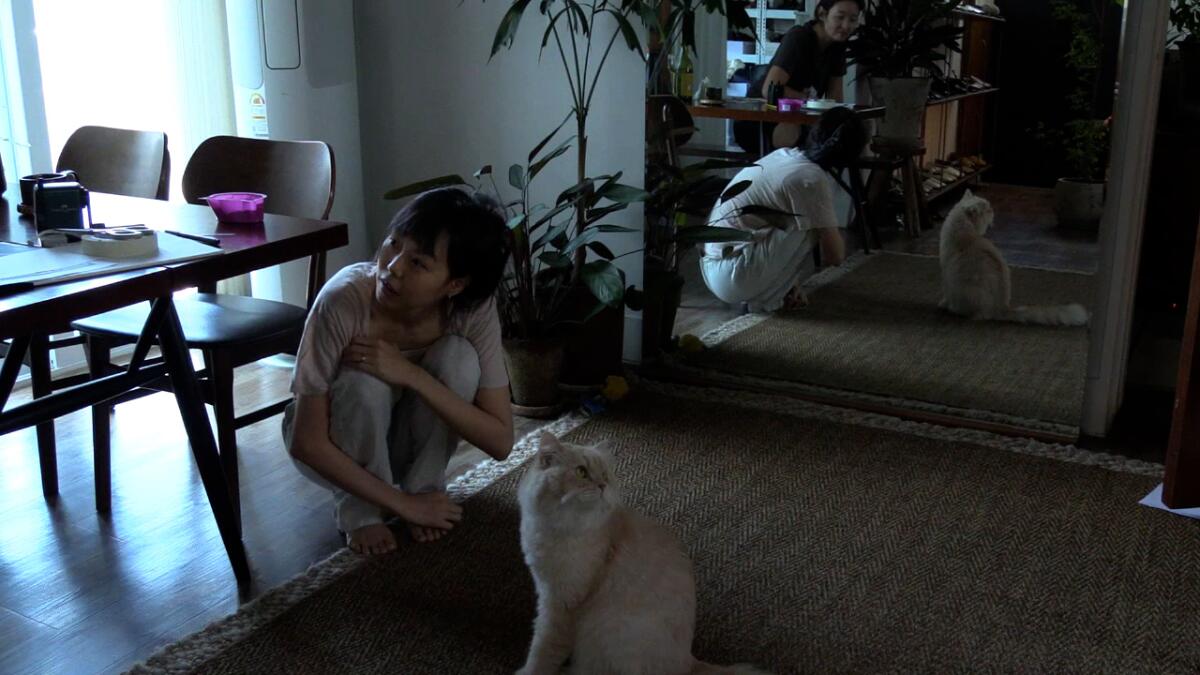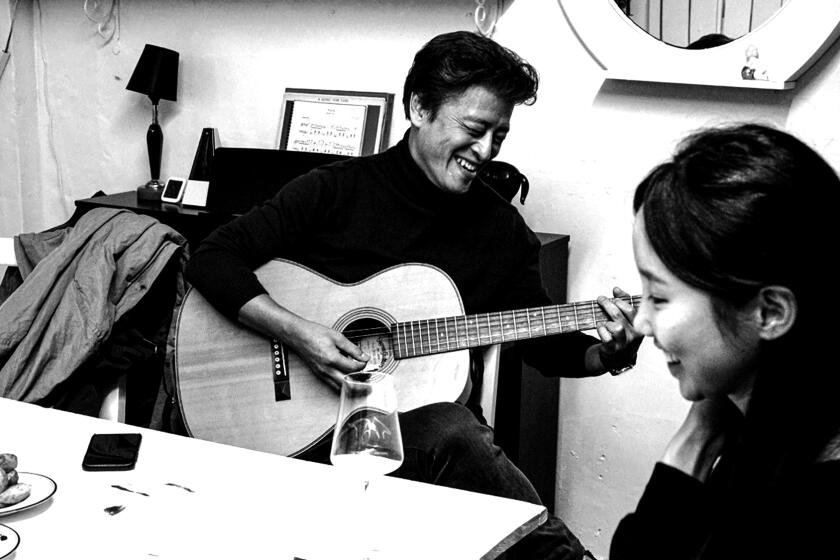Review: ‘In Our Day’ sees a master returning to his usual elements — in endless variation

- Share via
Hong Sang-soo’s ability to transform the ordinary into something reaching toward ecstasy makes him one of the most exhilarating filmmakers working today. In his 30th feature, the prolific South Korean director revisits familiar themes (artists in crisis) and narrative frameworks (a two-story structure) to continue examining the questions that are central to his work. What is the meaning of life? How does one pursue a pure artistic vision?
The film follows two seemingly unrelated storylines. In the first, Sangwon (Kim Min-hee, Hong’s real-life partner), a retired actress, returns to Korea and stays with her friend Jung-soo (Song Sun-mi) as she contemplates her next moves. Sangwon’s younger cousin Jisoo (Park Mi-so) visits her, seeking advice on becoming an actress. In the second, an aging poet, Uiju (Ki Joo-bong), is visited by two young admirers, Kijoo (Kim Seung-yun) a documentary student, and Jaewon (Ha Seong-guk) an ardent fan who is himself an aspiring actor.
As the film alternates between the two arcs, the similarities appear superficial at first: gatherings of three, guitars given as presents, a younger generation seeking counsel from their elders. There are hints of a shared past — the idiosyncratic way some of them eat their noodles, with a spoonful of gochujang (hot pepper paste). But the two storylines never converge. Hong invites us to look beyond story parallels into something simultaneously deeper and more quotidian.
One of the great pleasures of experiencing Hong’s films comes in the anticipation of encountering some of his well-worn tropes, then watching him scramble them anew. There are familiar scenes involving bottles of soju, moments of awkward conversation and garbled philosophizing in this film. They unfurl in Hong’s long, leisurely takes and through his particular gift for coaxing enthrallingly natural performances from his actors. (He also produced, shot and edited the film and composed the music.)
Three stories unfold over three stories in this ingeniously constructed comedy-drama from prolific South Korean filmmaker Hong Sang-soo.
The key to unlocking the film is found in Jung-soo’s cat, named Woori, meaning “we” or “us” in Korean. A paragon of purity (“Animals are angels, truly,” remarks a character), Woori reflects the desires of the protagonists and the auteur himself. When Sangwon introduces the cat to her cousin, it sounds like she’s talking about herself: “Isn’t he pretty? This is us.” Even the title of the film can be read as both “In Our Day” or “Woori’s Day.” Whose day are we watching unfold, exactly? Is it the cat’s, the poet’s or Hong’s?
Jung-soo worries that the cat eats too much. But Sangwon is more sanguine. “What’s the point of living anyway? Eat your fill,” she tells Woori as she hands down treats. It’s as much a prescription for the cat as it is for herself. Later, when the cat goes missing, Sangwon wonders why it would jump from the balcony to escape. “It’s their instinct to jump,” says Jungsoo.
Sometimes the film’s wisdom takes on a homespun quality. Sangwon’s advice to her cousin starts off as a rant about the necessity of honesty in acting and how she was never able to achieve that herself. But when she crouches down to look at the planters lining the balcony, she shares something closer to truth. She tells Jisoo that she likes to commune with plants. A small flower once spoke to her, reassuring her that “everything’s OK,” and that “however much I’m blown, I believe.” This story moves Jisoo to tears.
“In Our Day” also alludes to some biographical details about Hong, who first collaborated with Kim Min-hee on 2015’s “Right Now, Wrong Then” and subsequently began an affair with her, leading to the end of his marriage, a Korean media scandal at the time. (“It’s an old story. Let’s not talk about it,” says the poet Uiju, also surnamed Hong.) Jisoo abruptly brings up the first time she had sex. (“It’s no big deal now, but thinking back on it, it was the first I came to know guilt,” she says.) Hong’s early work showed a lot of ugly, shameful sex; these days, there’s hardly any sex in it at all.
It’s a quietly revelatory film from an auteur who never stops looking. “Maintaining a clear vision might be the hardest thing in the world,” Uiju tells his visitors. “You must devote your life to it for a chance of keeping it.” That might be the closest we’ll get to an artist’s statement.
'In Our Day'
Not rated
In Korean, with subtitles
Running time: 1 hour, 24 minutes
Playing: Lumiere Cinema, West Los Angeles; Vidiots, Eagle Rock
More to Read
Only good movies
Get the Indie Focus newsletter, Mark Olsen's weekly guide to the world of cinema.
You may occasionally receive promotional content from the Los Angeles Times.








